#sharecroppers
Explore tagged Tumblr posts
Text
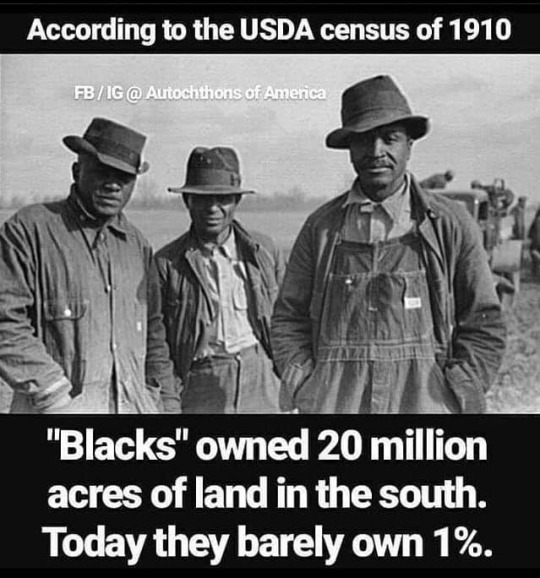
314 notes
·
View notes
Text
On a cold December morning in 1931, a short, elderly Black woman set out on a 24km (15-mile) walk from her homestead in Alabama, United States, on a quest for justice. The long trek to the court in Selma was no small undertaking for a person in her mid-70s. But Matilda McCrear was determined to go and make her legal claim for compensation for the horrors that she and her family had been through.
Until her death 85 years ago on January 13, 1940, Matilda was the last surviving passenger on the last-ever slave ship bound from the West African coast to North America in late 1859...
Her story began many decades before and thousands of miles away from that sharecropping homestead. Originally named Abake – “born to be loved by all” – the girl later renamed Matilda by her American “owner” came into the world circa 1857, among the Tarkar people of the West African interior.
In 1859, at the age of two, little Abake was captured along with her mother (later renamed Grace), her three older sisters and some other relatives, by troops of the Kingdom of Dahomey, located in what is now Benin. Torn away from the rest of their family, they were victims of an age-old regional warfare which underpinned an equally ancient but persistent trade in slavery reaching across North and East Africa, the Ottoman Empire and eventually the Americas...
...Foster’s ship, Clotilda – a two-masted schooner, 26 metres (86 feet) in length – is now infamous as the last ship known to have carried slaves across the Atlantic to North America. By this time it was an illegal journey, for while slavery continued across the southeast of the US (and in parts of South America), the importation of slaves had been prohibited since 1808. The Clotilda set sail from Ouidah late in the year, purportedly carrying lumber – the 11-man crew being promised double their normal wage to keep quiet about the true contents, as per an entry in Foster’s journal.
Their route across the Atlantic was known as the “Middle Passage”, making up the second part of a triangular trade route connecting Europe, Africa and the Americas. Ships carried weapons and manufactured goods from Europe to the “slave coast” of West Africa on the first part of the round trip; in the Middle Passage, that cargo was traded for enslaved Africans who were transported to the US and South America, where they were usually sold by auction; and on the final course, the vessels returned to Europe usually laden with cotton, tobacco and sugarcane...
...Foster navigated the Clotilda, now carrying 108 slaves, into the port of Mobile, Alabama under cover of darkness in early 1860. He had it towed up the Mobile River to Twelvemile Island, where the captive Africans were transferred to a river steamboat. Foster wrote in his journal that the Clotilda was then burned to destroy any evidence...
...At Twelvemile Island, Abake, her mother and her 10-year-old sister were handed over by Foster to one of the financial backers of Clotilda, a wealthy plantation owner by the name of Memorable Creagh.
In another heartbreaking separation, Abake’s two other sisters (whose names are unknown) were sent elsewhere, never to be seen again – a typically brutal fate for so many of those regarded as a mere commodity...
...Matilda was still a small child when the Civil War broke out in the US in April 1861. Alabama, along with Virginia, North and South Carolina, Mississippi, Florida, Georgia, Louisiana, Texas, Arkansas and Tennessee, seceded from the US and formed the Confederate States of America – on the grounds that the institution of slavery, the lifeblood of southern economies, was threatened by the federal government in Washington
President Abraham Lincoln made his Emancipation Proclamation on January 1, 1863, declaring that all enslaved people in the Confederate states were free. This had no immediate effect on Matilda and her family, as the Civil War continued to rage. But when the Confederates were defeated on June 19, 1865, Matilda and her family were liberated...
...But after 1865, freed slaves did not find themselves in a friendly world. Many white Americans reacted with indignant fury to the idea of Black people being their equals. In a harsh and unwelcoming world, there were few options for uneducated ex-slaves other than to remain on the plantations as “sharecroppers” – a system whereby a tenant farmed a portion of land in exchange for a share of the crop. Sharecropping often involved contracts that trapped tenants in debt and poverty and which in practice was not far removed from actual slavery.
Upon her emancipation, Matilda and her family thus became supposedly free people. But, as Martin Luther King Jr pointed out in a 1968 sermon, “Emancipation for the Negro was only a proclamation. It was not a fact. The Negro still lives in chains: the chains of economic slavery, the chains of social segregation, the chains of political disenfranchisement.”
During the post-Civil War period of “Reconstruction”, many new federal laws promoting racial equality were quickly met by local state measures designed to keep Black people “in their place” and ensure that white people remained ascendant. This is seen in the reaction, at the state level, to the 13th, 14th and 15th amendments to the US Constitution.
The 13th Amendment of 1865 officially ended slavery in all US states and territories. Formerly enslaved people were legally freed, while the Freedmen’s Bureau was established to aid freed slaves through the provision of food, housing, medical aid, schooling and legal support.
To counter this, southern states, including Matilda’s home of Alabama, enacted the so-called “Black Codes”, curtailing the right of African Americans to own property, conduct business, buy and lease land or move freely in public spaces. The Black Codes forced many Black people into newly exploitative labour arrangements such as sharecropping.
A central element of the Black Codes was “vagrancy” laws. Through a system known as “convict leasing”, many African-American boys and men were arrested for minor offences such as vagrancy, imprisoned, and then leased out to work for private businesses. This created a new system of forced labour which again was little more than slavery. Convict leasing was legally rooted in the so-called “exception clause” of the 13th Amendment which states, “Neither slavery nor involuntary servitude, except as a punishment for crime whereof the party shall have been duly convicted, shall exist within the United States.”
Convict leasing is prevalent in the US to this very day, with most working prisoners – still overwhelmingly Black and Hispanic – being paid only a few cents per hour. And even upon their release, ex-convicts have always faced immense hurdles to finding employment, getting credit, doing business or buying property due to their prison records...
...Matilda later entered a common-law partnership with a German-born man called Jacob Schuler and had a total of 14 children, 10 of whom survived into adulthood. What befell the other four is unknown. Whether she was prevented from marrying her partner by the ban on interracial marriage, or chose that arrangement, is also not known. In any case, Matilda appears not to have benefitted financially from the relationship, as she remained a sharecropper, living in the vicinity of Selma, Alabama, for most of her working life. At some point, she changed her surname from Creagh to McCrear, perhaps to distance herself from her enslaver and as an assertion of her own identity. Over the generations, the family surname has seen a number of further variations, including Crear, Creah, Creagher and McCreer...
...The Selma Times-Journal news story provides a vivid description of Matilda: “She walks with a vigorous stride. Her kinky hair is almost white and is plaited in small tufts and with bright-coloured string … Her voice is low and husky, but clear. Age shows most in her eyes … yet her … skin is firm and smooth.”
The article went on to relate that “Tildy has vigor and spirit in spite of her years … endurance and a natural aptitude for agriculture inherited from the Tarkar tribe, made [her] a thrifty farmer.”
Durkin writes that Matilda’s story is particularly remarkable “because she resisted what was expected of a Black woman in the US South in the years after emancipation. She did not get married. Instead, she had a decades-long common-law marriage … Even though she left West Africa when she was a toddler, she appears throughout her life to have worn her hair in a traditional Yoruba style, a style presumably taught to her by her mother.”...
...John Crear, a retired hospital administrator and community leader now in his late 80s, was born in the house Matilda resided in, and her funeral is one of his earliest memories. His grandmother’s strong character apparently passed into family lore. “I was told she was quite rambunctious”, he said.
He discovered more about Matilda when he and his wife carried out some research of their own into the family history. “I had no idea she’d been on the Clotilda”, he said. “It came as a real surprise. Her story gives me mixed emotions because if she hadn’t been brought here, I wouldn’t be here. But it’s hard to read about what she experienced.”
Matilda waited all her life for some form of justice and it would be another 14 years before the civil rights movement began to challenge the systemic racism she faced. Iconic leaders such as Martin Luther King Jr and Malcolm X pointed out the hypocritical gap between the ideals of the 13th, 14th and 15th Amendments and the actual lived reality of African Americans.
In a 1964 speech, Malcolm X demanded: “… our right on this earth … to be respected as a human being, to be given the rights of a human being in this society … which we intend to bring into existence by any means necessary.”
Although Matilda missed out on witnessing any of this, her grandson was active in the civil rights movement. “You can read about slavery and be detached from it,” he told National Geographic. “But when it’s your family that is involved, it becomes up close and very real.” During the Civil Rights movement, he was arrested and imprisoned on charges of assault and battery – for the offence of stopping a white man who attempted to stuff a live snake down his throat.
Indeed, many civil rights campaigners faced extreme violence from the police and the National Guard, leaving many injured, imprisoned or even dead, as in the case of both Martin Luther King Jr and Malcolm X.
But their sacrifices were not in vain. By the mid-1960s, the entire plethora of Jim Crow statutes had been taken down. Segregation in public schools was deemed unconstitutional in the 1954 case of Brown v Board of Education; discriminatory electoral practices such as literacy tests and grandfather clauses were banned by the Voting Rights Act of 1965; and all other forms of segregation and employment discrimination were outlawed by the Civil Rights Act of 1964.
These were statutory measures aiming to eradicate prejudice in the official sphere. However positive their effect, deeper-rooted racism at the societal level remains a feature of US life.
...
This is just excerpts from the article. I want everyone to read it in whole. The last surviving (official) chattel slave in the United States only died in nineteen forty. My grandmother--who's still alive--was a teenager at the time. This isn't ancient history, this is all too fresh and lingering.
#Matilda McCrear#Abake#slavery#chattel slavery#American history#American south#sharecroppers#prison labor#penal slavery#Civil Rights#today in history#i cried my eyes out reading this
11 notes
·
View notes
Text
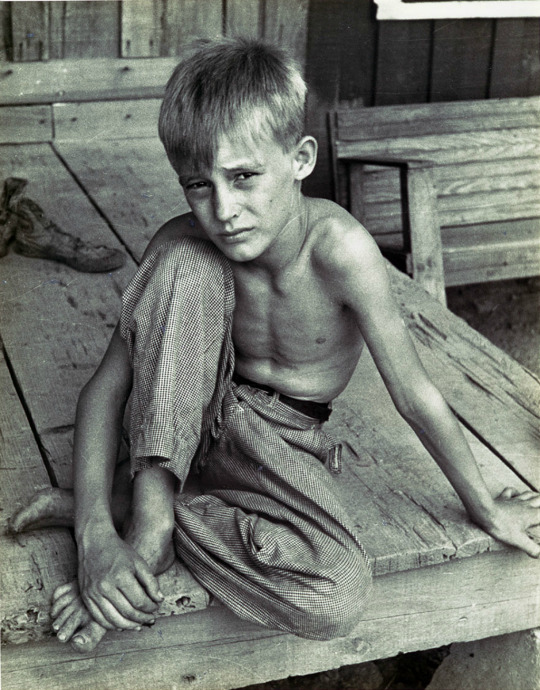
Son of Sharecropper. Mississippi Country, Arkansas. 1935
Photo: Arthur Rothstein- Library of Congress
44 notes
·
View notes
Text
Erskine Caldwell: Beyond Tobacco Road
A look today at the much-neglected progressive Southern author Erskine Caldwell (1903-1987), born 120 years ago today. Caldwell was decidedly not neglected in his own time; that’s the whole point. His most popular books and adaptations thereof broke records; we’ve had dozens of occasions to mention his most famous one on this blog. To sell that point, we’ll talk about the famous works first, and…
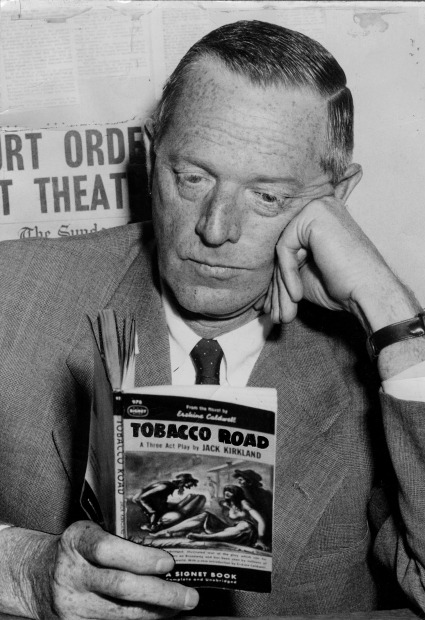
View On WordPress
#author#book#Erskine Caldwell#God&039;s Little Acre#novel#sharecroppers#south#Tobacco Road#writer#You Have Seen Their Faces
2 notes
·
View notes
Text
On the night of September 30, 1919, approximately 100 Black farmers attended a meeting of the Progressive Farmers and Household Union of America at a church in Phillips County, Arkansas. Many of the farmers were sharecroppers on white-owned plantations in the area, and the meeting was held to discuss ways they could organize to demand fairer payments for their crops.
Black labor unions such as the Progressive Farmers were deeply resented among white landowners throughout the country because unions threatened to weaken white aristocratic power. The union also made efforts to subvert racial divisions in labor relations and had hired a white attorney to negotiate with land owners for better cotton prices.
Knowing that Black union organizing often attracted opposition, Black men stood as armed guards around the church while the Phillips County meeting took place. When a group of white people from the Missouri-Pacific Railroad attempted to intrude and spy on the meeting, the guards held them back and a shootout erupted. At least two white men were killed, and enraged white mobs quickly formed.
The mobs descended on the nearby Black town of Elaine, Arkansas, destroying homes and businesses and attacking any Black people in their path over the coming days. Terrified Black residents, including women, children, and the elderly, fled their homes and hid for their lives in nearby woods and fields. A responding federal troop regiment claimed only two Black people were killed, but many reports challenged the white soldiers’ credibility and accused them of participating in the massacre. Today, historians estimate hundreds of Black people were killed in the massacre.
When the violence was quelled, 67 Black people were arrested and charged with inciting violence, while dozens more faced other charges. No white attackers were prosecuted, but 12 Black union members convicted of riot-related charges were sentenced to death. The NAACP, along with local African American lawyer Scipio Africanus Jones, represented the men on appeal and successfully obtained reversals of all of their death sentences.
#history#white history#us history#black history#am yisrael chai#jumblr#republicans#democrats#September 30 1919#September 30#Progressive Farmers#Household Union of America#Phillips County#Arkansas#sharecroppers#plantations#plantation#work#working class
0 notes
Text
#Black sharecroppers#American South#Vintage photographs#1939-1941#sharecroppers#Black American History#Black history
1 note
·
View note
Text
Leaving Henry: The Poignant Life Journey | Excerpt from Chapter One
The Author and her Mother Hello Everyone! My latest novel, Leaving Henry will be available on Amazon.com any day now. It’s been a long road writing my mother’s amazing story, and I can’t wait to share it with all of you. Below is an excerpt from chapter one! Enjoy and don’t forget to purchase your copy on Amazon next month! CHAPTER ONE I woke up on my fifth birthday wet and smelling like pee.…
#American#escapism#Family#Farming#Friendship#Henry#Hope#Humor#life#Nonfiction#nostalgia#Sharecroppers#Tennessee
0 notes
Text
The Jordan side of my family were sharecroppers. My grandfather Willie Bo Jordan made it through the third grade. He then went to work in the fields with his Mother. His great-grandchildren are Ph.D. and business owner, another a Television producer for an NPR station and Photographer, and the other a graphic designer for a national magazine and a multi-instrument musician. And still we rise.
#farming#black farmers#sharecroppers#vital community#vitalportal#vital information exchange#additional information#thevitalportal#vital media#blacklivesmatter#blacktwitter#vital politics
0 notes
Text
Sinners is everything. It’s a period piece. It’s a horror movie; a vampire film, and a folk horror, and a horror noir. It’s an action-thriller, and a bittersweet tragic love story, and a dark coming-of-age, with three endings, each genre with an emotionally satisfying conclusion. It’s written with such historical accuracy and honesty and attention to detail it might as well be a true story. The man who played Old Sammie lived the real thing.
#yeah fun and heart-squeezing fact: Buddy Guy? the man who played Old Sammie?#he lived the story Ryan Coogler told#in an interview piece Coogler went to meet Guy—wanting him in the film—they shared the script and then Guy told his life story#being a sharecropper growing up and moving to Chicago to become a musician#Coogler didn’t know that before but broke down hearing it bc minus the vampires? this was Guy’s real life#I find it chilling Coogler wrote a movie so real that it ends with a man who lived it. in real life and in character.#(it’s also. Black artists who respect and influence each others work. Coogler wanted Guy bc he grew up listening to that music#and his dad loved Guy’s work. Guy hasn’t been much for movies but his grandkids love Coogler’s films which inclined him to sit and listen#and then Guy decides to be in Sinners. tying it all together in such a thematically appropriate way. artists who inspire artists.#it’s the continuum of creation. it’s the spirits of ancestors and descendants all existing together)#also shoutout to the story structure; we got three endings for our three protagonists and all of them are perfect and devistating#Smoke and Stack and Sammie all have an ending in a different genre and they’re all satisfying and tie together#in a way that doesn’t detract but enhances the story#sinners#sinners 2025#sinners (2025)#Buddy guy#Ryan Coogler#sinners spoilers#(not really but mentioning Old Sammie and the ending—y’know)#my post#sinners analysis
98 notes
·
View notes
Text
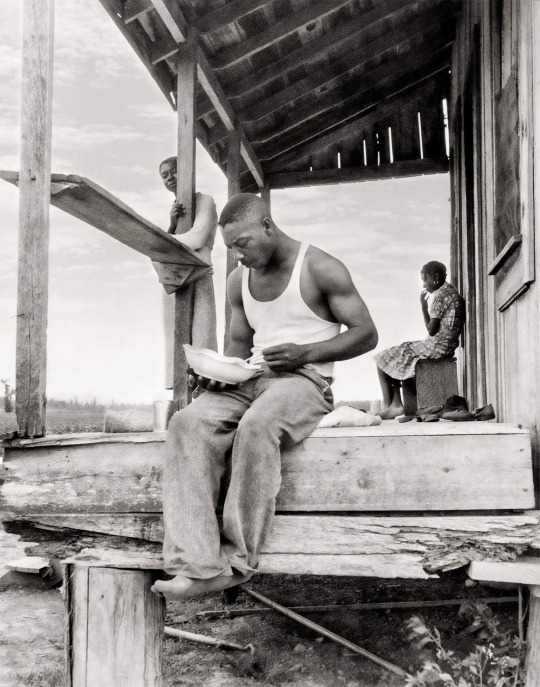
Man eating on the porch. Clarksdale, Ms. - 1937
Photographer: Dorthea Lange
308 notes
·
View notes
Text


Elizabeth Catlett (1915-2012). Sharecropper. 1952. Linocut/color linocut on cream Japanese paper.
53 notes
·
View notes
Text
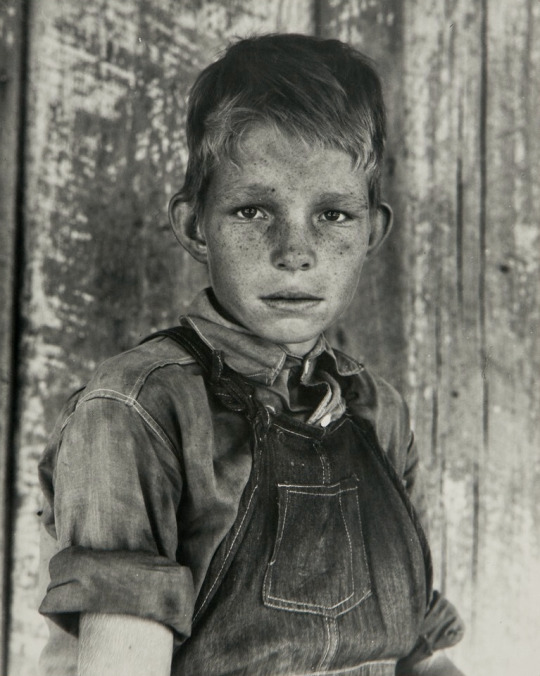
Twelve-year-old son of a cotton sharecropper near Cleveland, Mississippi, 1937 - Dorothea Lange (1895 – 1965), American
153 notes
·
View notes
Text
#273
Bitter sharecroppers stand in a barren field, a hard winter ahead of them. But as they scream curses to the sky, the sky answers: an angel descends to speak with these mortals.
—
Today’s campaign:
Feras’ family, from Gaza Funds.
€4,877/€25,000 [20%]
#writing prompt#creative writing#writing#writeblr#palestine#gaza funds#olm original#sharecropper#historical#angels#religion#fantasy
15 notes
·
View notes
Text

Saw Sinners last night and y'all it was so so so so so so so SOSOSOSOSO GOOOD!
Spoilers beneath the cut!
I haven't been moved by a movie in a while and I have a looooot of thoughts.
The music, the imagery, the VOICES, it was all such a wonderful blend of spirit and history and heart that I NEED to see it again to bathe in it lol
The ending felt bittersweet to me but maybe that was the point? I'm so happy Smoke and Annie got their peace with their baby at the end. Annie was on POINT the whole movie. When she came from downtown with that picked garlic, I nearly whooped in the theatre lmao
She was the good sense. She was the truth and she was the vision. Annie was not afraid of death, but only being apart from the people she loved. She knew that the vampires couldn't have her, couldn't take what she knew. Annie was selfless in the sense of giving her all to protect who was left and FUCK did that hurt.
Now Mary....may be my only hang up 🤷🏾♀️
And I have to ask, why didn't Mary live as a black woman if she didn't want to be white? She had a support system through Smoke, Annie, Stack, Cornbread, etc (probably way more) and with the way the one-drop rule worked back then, she only had to say something and she could have been with the community that she really wanted to be with. Unless the secret was too running too deep in her family and she would have risked her immediate family's safety?
We saw how Grace and Bo made a living in town. How they were still connected to their community and offering business to others. Why couldn't Mary do that?
I know it's complex and nuanced but to see her be so assertive and open with how she felt about Stack (yo, that train station scene had me fucking scared especially after we heard about how Delta's friend was lynched not too long ago) but somehow be forced to live a life she didn't want and marry a white man...it's giving Passing by Nella Larsen. I don't know if she was literally forced or if she "inherited" the need to pass for survival. I know it couldn't have been easy for her but, honestly, from this first watch, I don't feel that badly for her either.
I'm more annoyed than she talked all that shit to go outside and was acting like she was afraid to fire that fucking gun tho....😑
I don't know, to be honest, I have a lot of layered feelings about Mary but I may just need to journal about it unless y'all wanna hear them lmao
The twinnnnsssssss were so good. Smoke is my favorite because he ran that shit lmao! I loved how Smoke was the right hand and Stack was the left. They picked up on what the other needed, they had each other's back, they bickered and came together and even a little death couldn't kill that bond.
Sammie, my darling darling Sammie, he was the piece of our hearts that we have to protect. Where we keep our joys, our sorrows, our song--we have to protect it but it can't be by smothering it. Sammie was the heartbeat of the movie. He was the eyes that could see the silver in every sinner he met, meeting them with kindness and curiosity.
I'm so happy that Sammie went on and lived his dream (naming his place after Pearline 🥹)
I have a lot more to say but I still need to digest. Over all, 10/10! Got me in my feels, obviously, so it did a good job lmao!!
#Sinners 2025#sinners spoilers#spoilers#this will not be my last post about this lmao#oh Delta#Oh Pearline#oh Cornbread#those sharecroppers who wanted to dance their sorrows into smiles only to meet the sun dressed in flames#oh little lisa and i hope the girl who watched the truck made it out okay too
11 notes
·
View notes
Text
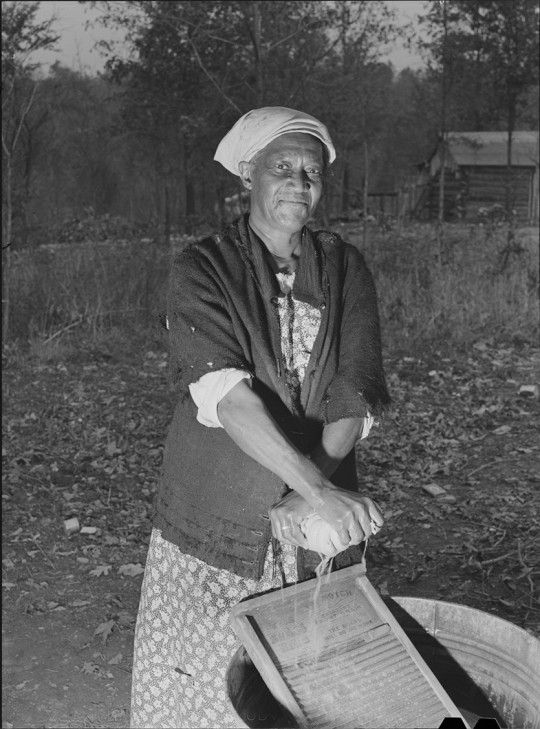
Evicted sharecropper’s wife. Butler County, Missouri, November 1939
Photo: Arthur Rothstein
91 notes
·
View notes
Text

Arthur Rothstein. Sharecropper’s Wife and Child. Arkansas. 1935
Follow my new AI-related project «Collective memories»
#BW#Black and White#黒と白#Schwarz und weiß#Noir et blanc#Preto e branco#vintage#retro#Arthur Rothstein#Sharecropper’s Wife#motherhood#Arkansas#1935#1930s#30s#kids#children#crianças#gamins#enfants#Kinder#子供たち#児童
72 notes
·
View notes